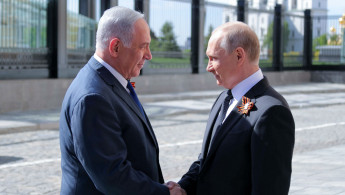Netanyahu heads to Russia after US withdraws from Iran deal
Netanyahu and Putin have held a series of meetings and phone conversations in recent months, mainly over Syria and the involvement there of Israel's arch-rival Iran in the war-torn country.
"The meetings between us are always important and this one is especially so," Netanyahu said before departing.
"In light of what is currently happening in Syria, it is necessary to ensure the continued coordination between the Russian military and (that of Israel)."
On Tuesday, Russia's foreign ministry said it was "deeply disappointed" by Trump's announcement that the United States would pull out of the Iran deal, while Netanyahu strongly supported the US president's "bold" move.
Netanyahu has long opposed the nuclear deal between world powers and Tehran.
Separately, Israel is deeply concerned over Iran's presence in Syria, where Tehran, like Moscow, backs President Bashar al-Assad's regime.
Russia and Israel have set up a hotline to avoid accidental clashes in Syria.
Netanyahu has vowed not to allow Iran to entrench itself militarily in neighbouring Syria, where Israel has been repeatedly accused of carrying out deadly airstrikes, with reports of Iranian forces killed.
In April, Israel's defence minister said Israel will not accept limitations on its "actions" in Syria from Russia or any other country, after Russia criticised its airstrike in the war-torn neighbouring country.
Defence Minister Avigdor Lieberman said in a video interview with the Walla news site: "We will maintain total freedom of action. We will not accept any limitation when it comes to the defence of our security interests."
"But we do not want to provoke the Russians. We have an open line of communication at the level of senior officers. The Russians understand us and the fact is that for years we have managed to avoid friction with them [in Syria]."
On 9 April, seven Iranian personnel were among 14 people killed in an early-morning strike on the T-4 airbase in Syria, with regime allies Iran and Russia blaming Israel for the attack.
Israel has not acknowledged those strikes, but admits carrying out dozens of raids in Syria to stop what it says are deliveries of advanced arms to the Iran-backed Hizballah militia, another of its enemies.
Russian President Vladimir Putin later called on Israeli Prime Minister Benjamin Netanyahu not to take any action that could further destabilise the situation in Syria.
There have been fears in Israel of Iranian retaliation.
Meanwhile, just prior to Trump's speech on Tuesday, the Israeli army asked authorities in the occupied Golan Heights to open and prepare missile shelters due to "irregular activity by Iranian forces" over the demarcation line in Syria.





 Follow the Middle East's top stories in English at The New Arab on Google News
Follow the Middle East's top stories in English at The New Arab on Google News
![The UAE is widely suspected of arming the RSF militia [Getty]](/sites/default/files/styles/image_330x185/public/2024-11/GettyImages-472529908.jpg?h=69f2b9d0&itok=Yauw3YTG)
![Netanyahu furiously denounced the ICC [Getty]](/sites/default/files/styles/image_330x185/public/2024-11/GettyImages-2169352575.jpg?h=199d8c1f&itok=-vRiruf5)
![Both Hamas and the Palestinian Authority welcomed the ICC arrest warrants [Getty]](/sites/default/files/styles/image_330x185/public/2024-11/GettyImages-2178351173.jpg?h=199d8c1f&itok=TV858iVg)